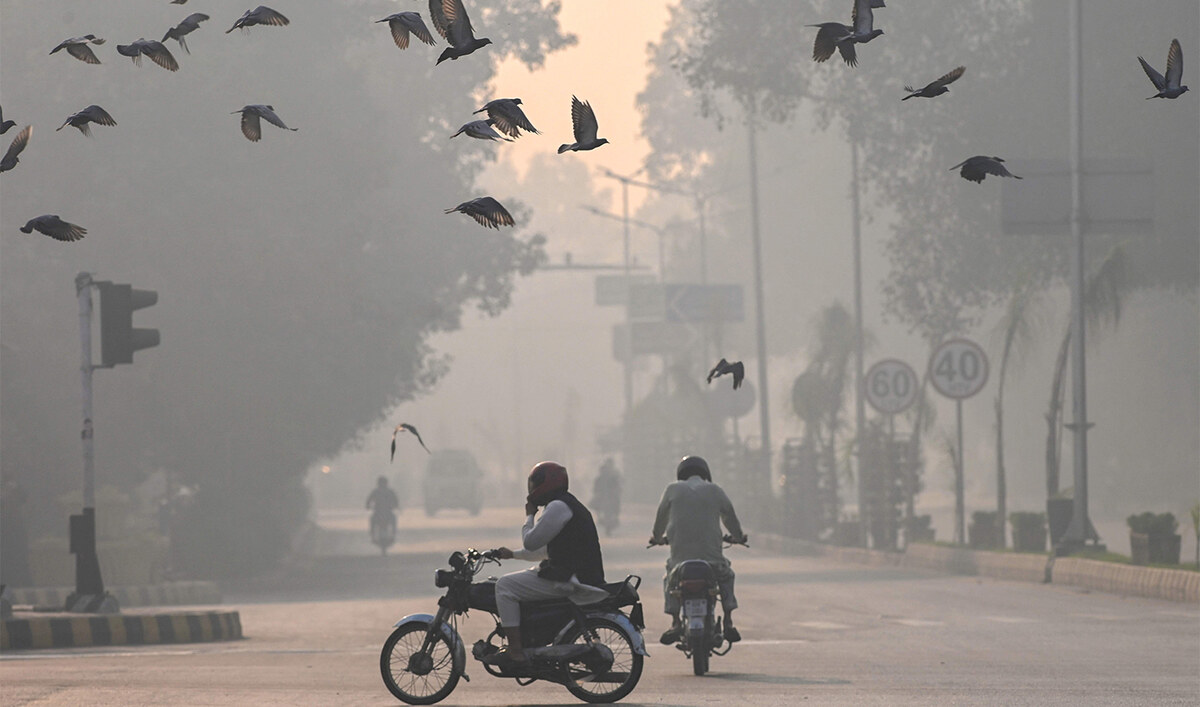ISLAMABAD: Dangerously poor air quality has forced Pakistani authorities in the cultural capital of Lahore to close primary schools for a week and ban the entry of heavy transport vehicles (HTVs) in the city on Fridays and Sundays, as air quality monitors showed Lahore was the second most polluted city in the world on Monday, after the Indian capital of New Delhi.
Lahore, a city of 14 million people, has for days been enveloped by dense smog, a mix of fog and pollutants caused by low-grade diesel fumes, smoke from seasonal stubble burning and winter cooling. The air quality index, which measures a range of pollutants, exceeded 1,000 on Saturday and Sunday, well above the level of 300 that is considered “dangerous” for human health, according to data from IQAir, a Swiss air quality monitor.
Breathing toxic air has catastrophic health consequences, with the World Health Organization saying strokes, heart disease, lung cancer and respiratory diseases can be triggered by prolonged exposure. Children are at particular risk.
“All the classes up to 5th grade in all schools (public, private & special education) located in the territorial jurisdiction of district Lahore shall remain closed for one (01) week with effect from 04-11-2024 (Monday) till 09-11-2024 (Saturday),” Dr. Imran Hamid Sheikh, a senior environment protection official, said in a notification on Sunday, adding that the situation would be assessed next Saturday to determine whether to extend the closure of schools.

Commuters make their way amid smog in Lahore on November 2, 2024. (AFP)
A separate notification by Punjab’s Environmental Protection Agency said vehicular emission was a “major source of air pollution” in the city and the volume of traffic significantly increased on Friday and Sunday evenings and nights.
“Punjab … do hereby order that there shall be complete ban on the entry of Heavy Transport Vehicles (HTVs) in District Lahore on Friday and Sunday nights,” the notification from the provincial environmental protection agency said. “The HTVs may enter in District Lahore as per their already specified timings in other.”
The ban will come into effect from Nov. 8 and stay in place till Jan. 31, 2025. Passenger buses, ambulances, fire brigades, Rescue 1122 vehicles, police and prison vehicles, government vehicles and HTVs carrying fuel, medicines and food supply items are exempt from the ban.
Last month, authorities banned schoolchildren from outdoor activities until January and adjusted school hours to prevent children from traveling when the pollution is most punishing in the early hours of the morning.
The government has said everyone in Lahore is required to wear a face mask and announced new restrictions in four “hot spots” in the city, including banning barbecuing food without filters at restaurants and restricting motorized rickshaws. Wedding halls must close at 10pm and artificial rain is likely to be used to combat pollution. Fifty percent of government employees must also work from home as part of the “green lockdown” in the city. Construction work has been halted and street and food vendors, who often cook over open fires, must close at 8 pm.
“Public should strictly follow precautionary measures, the elderly, the sick and children should be especially careful,” Provincial Punjab Minister Marriyum Aurangzeb said on Sunday, warning farmers against burning crop residues.
“Arrests and fines for violations will continue.”
FINES IN INDIA
In neighboring India, authorities in the capital and surrounding areas handed out fines to the owners of thousands of vehicles and construction sites for infringing pollution rules, in a bid to counter a slump in air quality during the last three weeks.
Almost 60,000 vehicles and more than 7,500 building sites were fined, officials said, as the Central Pollution Control Board (CPCB) rated Monday’s conditions ‘very poor’, with a score of 373 on its index that rates levels from zero to 50 as ‘good.’ IQAir’s Monday live ranking showed New Delhi was the world’s most polluted major city.
As many as 54,000 of the vehicles lacked a pollution under control (PUC) certificate, showing permissible levels of emissions, the Commission for Air Quality Management said, adding that almost 3,900 more were impounded as ‘overaged’.

Fishermen riding on boats move across the polluted Yamuna River in New Delhi on November 3, 2024. (AFP)
Environmental compensation payments have been ordered for 597 sites, while 56 have been told to close.
New Delhi battles intense pollution every winter as cold air traps emissions, dust, and smoke from farm fires in the adjoining farming states of Punjab and Haryana, forcing frequent school closures and construction curbs in response.
Air quality in the region is expected to stay ‘very poor’ until Wednesday, India’s earth sciences ministry said, and is likely to range from ‘very poor’ to ‘severe’ for the subsequent six days.
The CPCB says a rating of severe, in the range of 401 and 500 on its index, affects the healthy and can have serious effects on those already suffering disease.
IQAir has rated New Delhi the world’s most polluted capital for four years in a row, but poor air quality is a common winter problem across South Asia.
Rising pollution can cut a South Asian’s life expectancy by more than five years, the University of Chicago’s Energy Policy Institute (EPIC) said in its Air Quality Life Index last year.
Last week, the Punjab provincial government in Pakistan said it planned talks with India to resolve the problem, blaming deteriorating air quality on pollution wafted in from its neighbor.
– With inputs from Reuters















